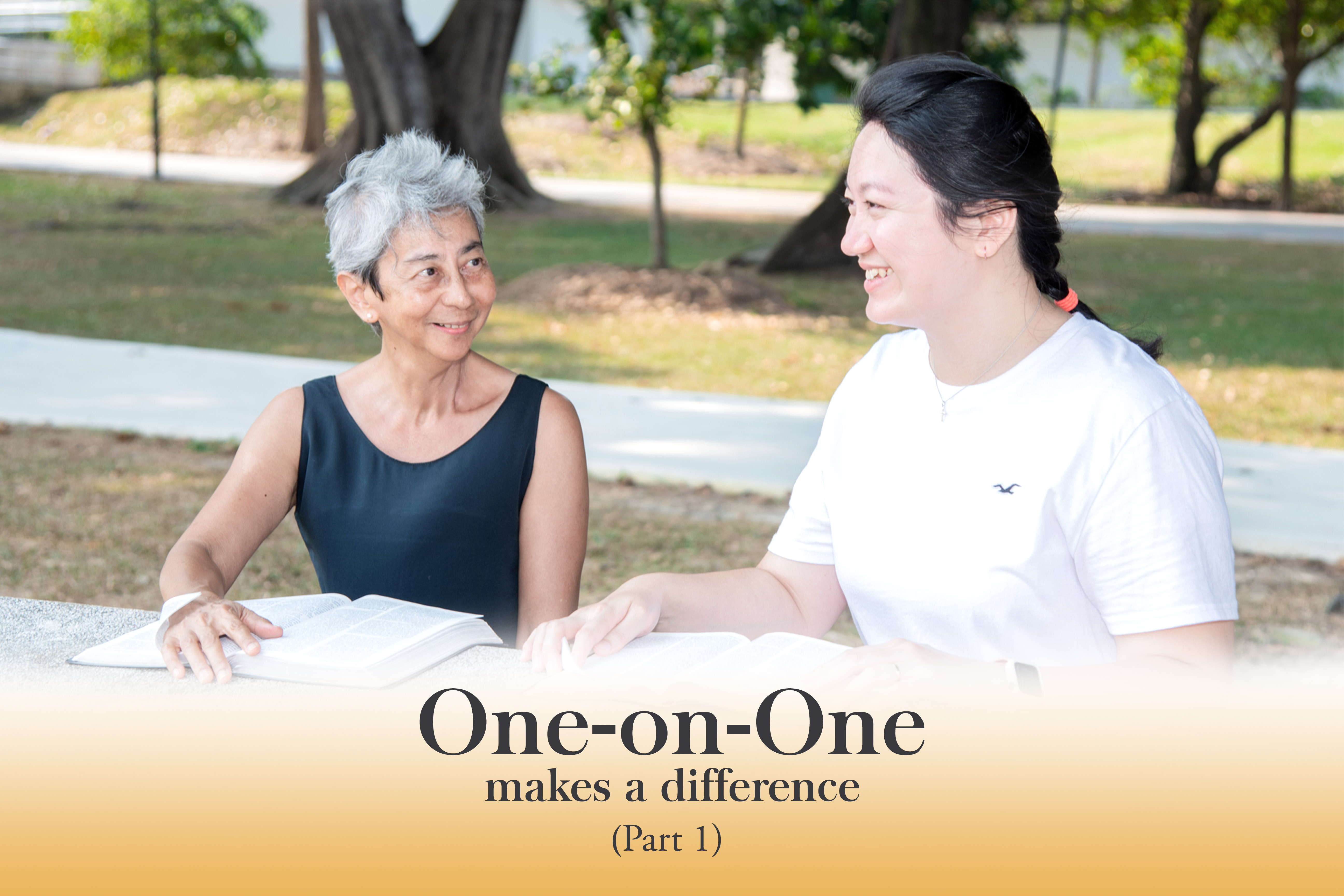One-on-One Makes a Difference — Part 1
Former National Director and Senior Mentor of The Navigators Singapore

Paradigm Shift
Pathway Unearthed
Does it make a difference when someone takes the time to meet up with you in person? The overwhelming response was YES!
We adopt the tone of ‘Come Alongside’, in the spirit of the Holy Spirit’s enabling. Oftentimes, when meeting one-on-one, we find ourselves feeling helpless and inadequately equipped to deal with the trials and difficulties people are facing. With no recourse, we resort to crying and praying earnestly to the Lord together. With no expectations of outcomes, we press on, step-by-step, painstakingly journeying alongside our friends. This approach stands in stark contrast to how we assist students in the campus world — man-to-man, discipleship, disciplemaking with objectives, syllabus, timetable etc. which are intense and fast-paced. Now, we are simply walking alongside our friends to help them cope with life’s challenges. Every now and then, there is a small breakthrough and we rejoice. One-on-one does matter.
Pattern Shown
During the one-on-one sessions, we would ask various individuals to share what they have heard from the Lord during their Bible reading. Often, there would be blank stares. Most would have read but are unable to remember what they have read. I challenge them to revisit the passage and read it again. Until they are able to recall and summarise in their own words what they have read and understood, they have not really understood.
Then comes the next question, “What have you learnt from the Lord?”, and finally, “What have you done about it?”
The process is painstakingly slow, yet it yields powerful impact when practised in accordance with Ezra’s example in Ezra 7:10 — studying, observing and teaching the Law. Once the Word is listened to, recalled, understood, and applied to one’s life, there is great power in sharing that knowledge with others.
Helping people to get into the Word is important, but we should not overwhelm them by forcing them to consume it like water gushing from a fire hydrant, where voluminous amounts gush forth. Instead, we encourage them to take a sip, just enough to satisfy their thirst so that they will return to it repeatedly in small portions until they are ready for more.
One middle-aged man said, “My son said that I did not teach the family to pray.” Rather than unleashing a fire hydrant hose on him, I gave him a sip. I quoted Philipians 4:6-7 and slowly explained what the verses meant — give God your anxieties and in return He will give you peace in Christ; no indication of how the prayer will be answered — yes, no, or maybe — but a definite peace.
I explained how I experienced a difficult situation when I broke some military regulations as a NS man and was placed on a charge. Claiming these verses, I experienced peace and later deliverance from an impending punishment. These verses helped me to remember that whenever I pray and give God my anxieties with thanksgiving, I will experience His peace. This man replied, “You have given me a key to unlock the door to my question. Now I know how to answer my son.”
I did one-on-one with a neighbour who was a taxi driver and a widower. He memorised 2 Corinthians 5:17 and was able to quote it to his 4 young passengers when asked if he "speaks in tongues" because they saw his Bible on his dashboard.
When he quoted the second verse, Galatians 2:20 (both verses from the ‘A’ Pack of NTMS [New Topical Memory System] ), they replied, “Uncle, you know your Bible very well!” When he did the same at home with his children, they were convinced to read their Bibles every night. When asked by his churchmates who watched him singlehandedly raise his 3 children to be so well-behaved, and as to how he did it, his reply was, "I asked them to read the Bible daily at night.” That has become a family routine.
In the examples given here, one-on-one discipling is not a rigorous affair, but a regular sharing of life and how the Word can be applied in real-life situations. One lady shared with one of our ministry leaders — “All these years, I had been listening to the preaching of the Word every Sunday and most of the time, I don’t know what is going on especially when they mentioned characters from the Old Testament. But now that you explain to me in this way, I can understand.”
Sometimes, all it takes is someone to care enough to be willing to invest his or her time in another ordinary person’s life to offer personal attention and guidance to help the person get going.
Once there is genuine interest and a desire to learn, we introduce the Basics such as Quiet Time, the 5 Assurances, and useful tools like the New Topical Memory System (NTMS), The Wheel and The Bridge of Life.
There was one man in his 40s who wrote in to The Navigators asking for spiritual help. He was working in a MNC (multinational corporation) as an executive. I went through the NavTools with him. He went home and taught it to his wife and 3 children. During the first few visits to his native home in India, he was asked to take the pulpit. He shared the basics he had learnt to the church congregation and they treated him as a VIP.
Persuading Others
Our motivation is that others can also be encouraged to adopt this mindset. Those who have already left the campuses and have moved into the community, churches and marketplaces often find themselves grappling with changes and challenges that make it difficult for them to continue from what they have known before. As a result, they stop labouring. They need new “lenses” to see what the Lord would want them to do in their present environment. By experimenting and grappling with real-life situations, we have gradually re-discovered that we can still influence our alumni in the process of discipling others, but the key lies in approaching it from a different angle.
One-on-one with a new motivation — to help others where they are, come alongside and walk with them. There is greater pathos and empathy for those facing challenges in their lives. How is Christ relevant in these situations? We just walk alongside these dear ones and allow them to respond to Christ personally, stretching their faith and deepening their trust in the Lord. We do not give advice, but in the process, we develop greater compassion as we listen to them attentively and pray earnestly with them. These are simple but powerful examples of how one-on-one makes a difference.
These men and women would not ask for help in a big group. For a start, they need a safe environment and trust to ask what they deem as “embarrassing questions”. But once they are given a simple tool, they are able to feed themselves in the Word, grow and help their families to do likewise.
We are thus promoting one-on-one to help us get started as we seek to obey the Great Commission, making disciples not just among students, but in the marketplaces, families and neighbourhoods. Would you join us in this?
(Click here for Part 2)



